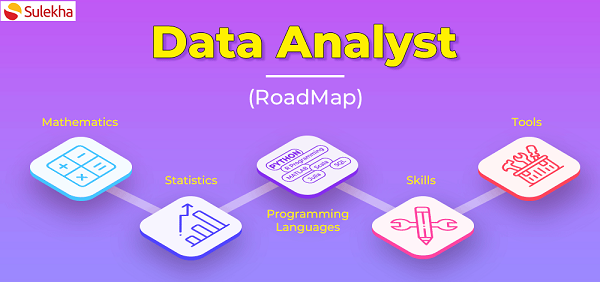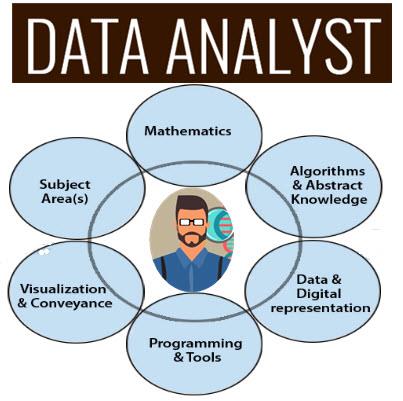What Does a Data Analyst Do? Your Career Guide

Data analysis is a demanding and ever-daunting career path for freshers and professionals who intend to begin their careers as data analysts—many top companies like Google, Amazon, Facebook, Microsoft, and Apple hire skilled individuals. Moreover, data analysts can work in many industries, such as business, finance, criminal justice, science, medicine, and government.
Additionally, the demand rises due to the increasing reliance on data-driven decision-making in businesses and organizations. The role requires working with complex and diverse data sources, including big data and IoT devices, necessitating a high level of expertise. Furthermore, data analysts must stay updated with rapidly evolving technology and possess specialized statistical analysis, data visualization, programming languages, and data management skills. Their work directly impacts business outcomes, driving growth and improving operational efficiency, making their skills highly sought after in the job market.
What Does a Data Analyst Do? In this blog, we will discuss the essential skills and how to become a data analyst. We will also delve deeper into career opportunities and salary perks.
Who is a data analyst?
A data analyst collects, processes, and analyzes data to provide insights and support decision-making in various industries.
They are responsible for interpreting complex data sets, identifying trends and patterns, and creating visualizations and reports to communicate findings.
Data analysts often work with large volumes of data from diverse sources, such as customer transactions, social media, or IoT devices, and use statistical and programming tools to extract valuable information.
Their role is crucial in helping organizations make informed decisions, improve processes, and drive business growth through data-driven strategies.
Data analyst roles and responsibilities
As discussed above, their primary responsibility is gathering and interpreting large amounts of data and derive insightful data.
Here’s what many data analysts do on a day-to-day basis:
Gather data: In data gathering, data analysts collect and extract relevant information from various sources, including databases, surveys, and digital platforms. They also ensure data quality, clean and organize the data, and prepare it for analysis to derive meaningful insights.
Clean data: In data cleaning, data analysts identify and rectify errors, inconsistencies, and missing values within the dataset using statistical methods, programming tools, and data wrangling techniques. This process ensures data accuracy and reliability for further analysis and interpretation.
Model data: In data modeling, data analysts use statistical and mathematical techniques to create models representing complex relationships within the data. They apply algorithms and predictive modeling to identify patterns and make predictions based on the data.
Interpret data: In data interpretation, data analysts analyze and interpret the results of their data analysis to draw meaningful insights and conclusions.
Present: After these processes, you must visualize the significant data for the respective team via a chart or graph.
What tools do data analysts use?
Data analysts often use various tools to make their work more accurate and efficient during data analysis. Some common tools in the data analytics industry include:
Programming language- Python, R, and SQL for Data manipulation and analysis
Statistical software - SPSS, SAS, or Stata
Data visualization tools- Tableau, Power BI, or ggplot2
Big data platforms -Hadoop and Spark
Machine learning libraries -TensorFlow or scikit-learn for predictive modeling.
Database management - MySQL, PostgreSQL, or MongoDB for data storage and retrieval
Paths to becoming a data analyst
If you intend to become a data analyst, you should follow these crucial steps:
Bachelor's degree: A data analyst should have a bachelor's degree in a field such as statistics, mathematics, computer science, or economics. These degrees provide a strong foundation in quantitative analysis, data management, and programming, essential skills for a data analyst. Data visualization, database management, and machine learning coursework can also benefit aspiring data analysts.
Professional certificate: Obtaining a data analyst certification can be beneficial as it demonstrates expertise and proficiency in data analysis. These certifications often cover statistical analysis, data visualization, database management, and programming languages commonly used in data analysis. They can also provide hands-on experience with data analysis tools and techniques.
Self-study: Support all the above two crucial steps by putting yourself in self-study. Self-development and practice will help you sustain the skills and knowledge obtained from academic studies and certification programs.
Skill required to become a data analyst:
1. Strong analytical skills
2. Proficiency in statistical analysis and data visualization
3. Knowledge of programming languages such as Python, R, or SQL
4. Familiarity with data mining and data cleaning techniques
5. Ability to interpret and communicate complex data findings
6. Experience with data modeling and predictive analytics
7. Understanding of database management systems
8. Attention to detail and accuracy in data analysis
9. Strong problem-solving and critical-thinking skills
10. Ability to work with large datasets and extract meaningful insights.
Types of data analysts' roles:
Data analysts are required in various industries where data-driven decision-making is essential. You’ll find data analysts in Technology, Finance and Banking, Healthcare, Retail and E-commerce, Marketing and Advertising, Government and Public Sector, etc. There are several types of data analysts, each specializing in different aspects of data analysis. Some common types of data analysts include:
1. Business Analyst
2. Financial Analyst
3. Marketing Analyst
4. Healthcare Analyst
5. Operations Analyst
6. Risk Analyst
7. Data Science Analyst
8. Research Analyst
These are just a few examples. There are many other specialized roles within the field of data analysis, each focusing on specific industries or areas of expertise.
Data analyst salary and job outlook
As of my last knowledge update in January 2022, the salary and job outlook for data analysts in the USA are generally positive. An Entry-Level Data Analyst typically earns an average annual salary of $50,000 to $70,000.
Job Outlook:
The demand for data analysts is high across various industries, including finance, healthcare, technology, and e-commerce. The increasing emphasis on data-driven decision-making contributes to sustained demand for skilled data analysts. As businesses continue to leverage data for strategic decision-making, the need for professionals who can analyze and interpret data is expected to grow.
Data analysts are crucial in helping organizations make informed decisions by transforming raw data into actionable insights. Their work contributes to strategic planning, process optimization, and overall business performance improvement.
Find a course provider to learn Data Analysis
Java training | J2EE training | J2EE Jboss training | Apache JMeter trainingTake the next step towards your professional goals in Data Analysis
Don't hesitate to talk with our course advisor right now
Receive a call
Contact NowMake a call
+1-732-338-7323Enroll for the next batch
data analysis online courses for beginners
- Jan 29 2026
- Online
data analysis online courses for beginners
- Jan 30 2026
- Online
Related blogs on Data Analysis to learn more

How to Become a Certified Data Analyst: Jobs, Skills, Salaries
Are you ready to unlock the secrets hidden within mountains of information? Then, data analysis is the field

Learn the Power of Data – Data Analysis Master Course
Introduction Data analysis

Who is a data analyst? Importance/ Awareness of Data Analyst
Data analyst is a professional who involves in the process of inspecting, cleansing, transforming and modeling data with the goal of discovering useful information, informing conclusion and supporting decision-making. This data analyst article gives

A Rejoinder from my College Diaries - Why Should I learn Data Analytics in Atlanta, GA
A Rejoinder from my College Diaries - Why Should I learn Data Analytics in Atlanta, GA

What is Streaming Data Analytics?
The days where the historical data analysis and batch reports conquered are through. Today’s word demands much smarter and powerful data analytics systems. Here comes the Streaming Data Analytics to the rescue. The Streams lets you process data as it

Passion drives you to become as a Data Analyst
If you can’t afford to fly, at least land on a sea to move on. Often people don’t get jobs based on their qualification. Then, by any chance or situation, they get placed in an IT firm. That’s how 80% of IT employees choose their career in IT in Indi
Latest blogs on technology to explore

Drug Safety & Pharmacovigilance: Your 2026 Career Passport to a Booming Healthcare Industry!
Why This Course Is the Hottest Ticket for Science Grads & Healthcare Pros (No Lab Coat Required!)" The Exploding Demand for Drug Safety Experts "Did you know? The global pharmacovigilance market is set to hit $12.5B by 2026 (Grand View Research, 202

Launch Your Tech Career: Why Mastering AWS Foundation is Your Golden Ticket in 2026
There’s one skill that can open all those doors — Amazon Web Services (AWS) Foundation

Data Science in 2026: The Hottest Skill of the Decade (And How Sulekha IT Services Helps You Master It!)
Data Science: The Career that’s everywhere—and Nowhere Near Slowing Down "From Netflix recommendations to self-driving cars, data science is the secret sauce behind the tech you use every day. And here’s the kicker: The U.S. alone will have 11.5 mill

Salesforce Admin in 2026: The Career Goldmine You Didn’t Know You Needed (And How to Break In!)
The Salesforce Boom: Why Admins Are in Crazy Demand "Did you know? Salesforce is the 1 CRM platform worldwide, used by 150,000+ companies—including giants like Amazon, Coca-Cola, and Spotify (Salesforce, 2025). And here’s the kicker: Every single one

Python Power: Why 2026 Belongs to Coders Who Think in Python
If the past decade was about learning to code, the next one is about coding smarter. And in 2026, the smartest move for any IT enthusiast is learning Python — the language that powers AI models, automates the web, and drives data decisions across ind

The Tableau Revolution of 2025
"In a world drowning in data, companies aren’t just looking for analysts—they’re hunting for storytellers who can turn numbers into decisions. Enter Tableau, the #1 data visualization tool used by 86% of Fortune 500 companies (Tableau, 2024). Whether

From Student to AI Pro: What Does Prompt Engineering Entail and How Do You Start?
Explore the growing field of prompt engineering, a vital skill for AI enthusiasts. Learn how to craft optimized prompts for tools like ChatGPT and Gemini, and discover the career opportunities and skills needed to succeed in this fast-evolving indust

How Security Classification Guides Strengthen Data Protection in Modern Cybersecurity
A Security Classification Guide (SCG) defines data protection standards, ensuring sensitive information is handled securely across all levels. By outlining confidentiality, access controls, and declassification procedures, SCGs strengthen cybersecuri

Artificial Intelligence – A Growing Field of Study for Modern Learners
Artificial Intelligence is becoming a top study choice due to high job demand and future scope. This blog explains key subjects, career opportunities, and a simple AI study roadmap to help beginners start learning and build a strong career in the AI

Java in 2026: Why This ‘Old’ Language Is Still Your Golden Ticket to a Tech Career (And Where to Learn It!
Think Java is old news? Think again! 90% of Fortune 500 companies (yes, including Google, Amazon, and Netflix) run on Java (Oracle, 2025). From Android apps to banking systems, Java is the backbone of tech—and Sulekha IT Services is your fast track t